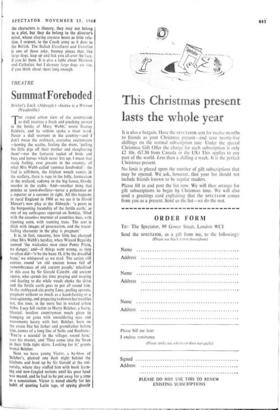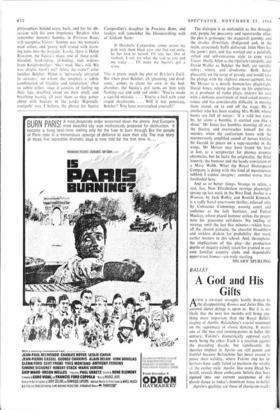THEATRE
Summat Foreboded
Belcher's Luck. (Aldwych.)---Justice is a Woman (Vaudeville.) `rTIHE stupid urban view of the countryside I as dull receives a fresh and crushing answer in the books of Mary Webb,' wrote Stanley Baldwin, and he seldom spoke a truer word. Never a dull moment in the country—and I don't mean the ordinary, everyday excitements —honing the scythe, foaling the mare, 'pulling the little pigs off their mother and slaughtering them'—nor the fantastic racket of birds and bees and horses which never lets up; I mean that nasty feeling, ever present in the country, of what Mrs Webb called `summat foreboded': the foal is still-born, the kitchen wench vomits in the scullery, there is rape in the folly, fornication in the orchard, sodomy in the big house, bloody murder in the stable. And—another thing that puzzles us town-dwellers—never a policeman or a reporter or a coroner in sight. All this happens in rural England in 1966 as we see it in David Mercer's new play at the Aldwych: 'a poem to the burgeoning fecundity of the fertile earth,' as one of my colleagues reported on Sunday, 'filled with the ceaseless murmur of countless bees, with ripening corn, with teeming trees. The text is thick with images of procreation, and the truest- feeling character in the play is pregnant.'
It is, in fact, uncanny, how little has changed since Mrs Webb's heyday, when Wizard Beguildy seemed 'the wickedest man since Ponty Pilate, no danger,' and—if things went wrong, as they so often did—`it be the bane. 0, it be the dreadful bane,' we whispered as we read. The action still centres round 'an old ancient house full of remembrances of old ancient people,' inhabited in this case by Sir Gerald CatesbY, old ancient squire, who spends his time praying and moping and fearing to die while weeds choke the drive and the fertile earth goes to pot all round him. In the stableyard sits pretty Lucy, peeling sprouts, pregnant without so much as a hand-fasting or a love-spinning, and preparing to drown her troubles not, this time, in the mere but in wicked urban Soho. Lucy fell victim to Harry Belcher, a beery, bloated, insolent countryman much given to lounging on gates with smouldering eyes and movements heavy with lust. Belcher, born on the estate like his father and grandfather before him, comes of a long line of Seths and Reubens : `You're a scandal in the villages round here,' says his master, and 'They come into the Swan in their little tight skirts. Looking for it,' grunts brutal Belcher.
Next we have young Victor, a by-blow of Belcher's, planted one dark night behind the kitchens and bred up by Sir Gerald at the uni- versity, where they stuffed him with book learn- ing and new-fangled notions until his poor head was mazed, and he had to be put away for a time in a sanatorium. Victor is noted chiefly for his habit of quoting Latin tags, of spying ghostly philosophers behind every bush, and for his ob- session with his own impotence. Readers who remember Sexton's Sammy, in Precious Bane, will recognise Victor: Sammy was `no woman's man' either, and 'pretty well crazed with learn- ing texts into the bargain.' Lastly, there is Helen Rawston, the Squire's niece, one of those cold- blooded, hard-riding, ill-boding, rich widows from Knightsbridge: 'She's mad. She's evil. We was alright, wasn't we? Afore she came?' cries luckless Belcher. Helen is 'perversely attracted to servants,' on whom she 'employs a subtle combination of frigidity and temptation.' (Not so subtle either, since it consists of feeling up their legs, dwelling aloud on their smell, and breathing heavily all over them as they potter about with buckets in the yard.) `Ripstitch- rantipole' was, I believe, the phrase for Squire Camperdine's daughter in Precious Bane, and readers will remember the bloodcurdling oath of Gideon Sarn:
If Dorabella Camperdine comes across my path with them black eyes and that red smile, let her look to herself. I'll take her. Out of wedlock, I ool, for what she said to you and me today . . I'll make the Squire's girl a w'orc.
This is pretty much the plot of Belcher's Luck. But when poor Belcher, all `glooming and drod- some,' comes to claim his own in the bed- chamber, the Squire's girl turns on him with flashing eye and cold red smile: 'You've made a squalid mistake. . . . You're a fool with your stupid daydreams. . . Will it not penetrate, Belcher? You have overreached yourself!' The dialogue is as outlandish as this through- out, purple for peasantry and squirearchy alike; the plot is grotesque; the stagecraft gummy; and the tirades ill-written, ill-digested and, in the main, atrociously badly delivered. John Hurt has the goon's part, and has worked- out a painfully stilted and self-conscious style to cope with Victor. Sheila Allen as the ripstitch-rantipole, and David Waller as Belcher the bull, are suitably sultry, wintry and drodsome. Both hover pleasantly on the verge of parody and would take the plunge with the slightest encouragement, but Mr Mercer is a dourly humourless playwright. David Jones, relying perhaps on his experience as a producer of radio plays, endows his cast with a dubious assortment of mud-caked country voices and has considerable difficulty in moving them round, on to and off the stage. He is another who has been reading Mrs Webb, whose books are full of noises: 'if a wild bee came by, let alone a bumble, it startled you like a shout.' Mr Jones has bumbles shouting all over the theatre, and overreaches himself for the murder, when the auditorium hums with the murmurously amplified sound of horses kicking Sir Gerald to pieces on a tape-recorder in the wings. Mr Mercer may have found his level at last, as a scriptwriter for phoney country chronicles, but he lacks the originality, the fitful honesty, the humour and the heady conviction of a Mary Webb. What the Royal Shakespeare Company is doing with this kind of meretricious rubbish I cannot imagine: summat worse than foreboded here.
And so to better things. Strange to relate, a real, live, New Elizabethan revenge playwright sprang up last week in the West End. Justice is a Woman, by Jack Roffey and Ronald Kinnoch, is a sadly banal courtroom thriller, relieved only by Constance Cummings wooing court and audience as the lady barrister, and Fulton Mackay, whose placid humour strikes the proper note for gruesome evil-doers. No inkling of revenge until the last five minutes—which have all the absurd panache, the cheerful bloodthirst and reckless disdain for probability that mark earlier masters in this school. And, throughout, the implications of this play—the production depths of iniquity calmly taken for granted in our own familiar country clubs and dependable upper-crust homes—are truly startling.
HILARY SPURLING















































 Previous page
Previous page